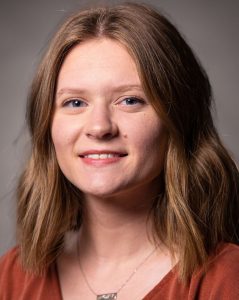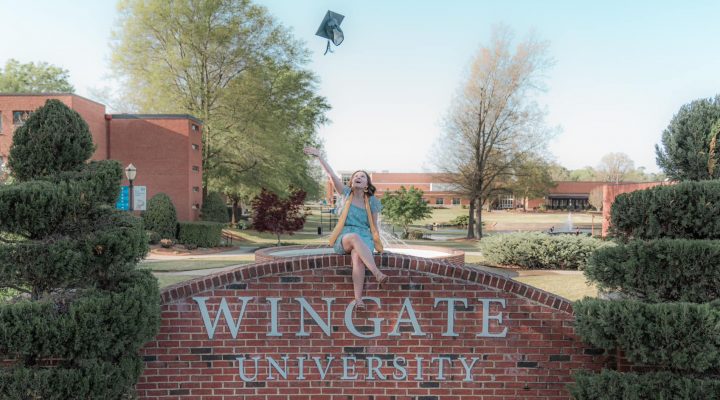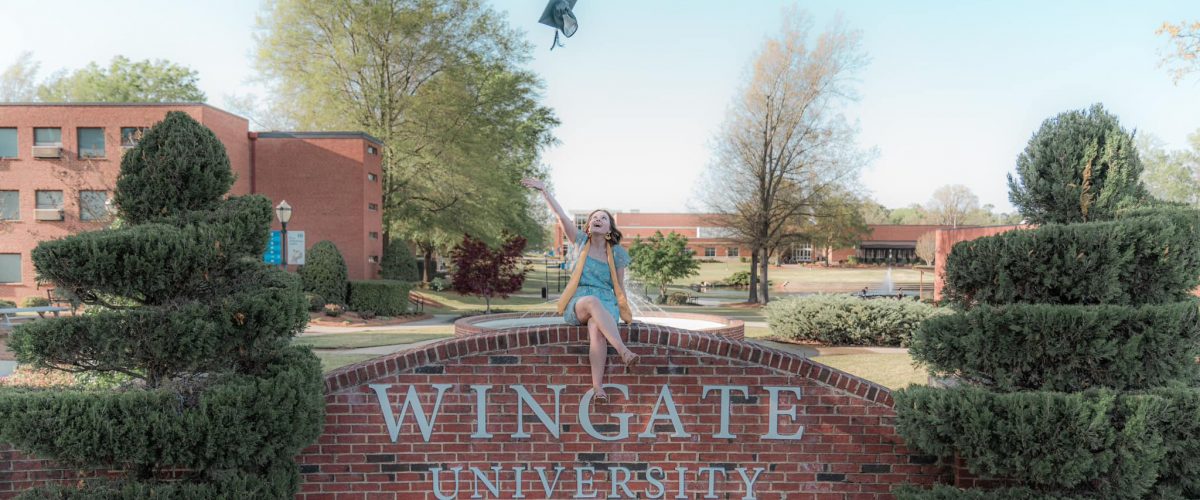In May 2021, Bo Burnham released the Netflix special Inside, a film self-created by Burnham during the COVID-19 pandemic quarantine. The film includes music and skits that cover an array of topics, including the psychological deterioration Burnham and many others experienced during the pandemic’s isolation period.
One of his songs, “That Funny Feeling,” offers a solemn reflection about the various world events that occurred during quarantine, with an air of absurdism representing humanity’s collective struggle to find reality amid the seemingly deteriorating world around us. After the film came out, snippets of the song trended on TikTok and were popularly used by college students mourning their forced transition to virtual school, which we somewhat jokingly called “Zoom University.”

Mallory Challis
Starting college at Wingate (or any other institution for that matter) in the fall of 2019 meant this common experience affected my entire cohort of college students. Just as we were beginning our second semester of college, we were uprooted from our new communities and growing friend groups and sent back home in quarantine.
It was a hard time, although it took me the past three years of reflection to realize it.
As a freshman, I’d come into college with some people close to me who were not very supportive of my goal to be a pastor (because I am a woman). Those relationships ended after my first semester here at Wingate. This was mostly because my professors and newfound friends put in the hard work of encouraging me every day.
Detour to a new beginning
Coming back to school in January 2020 symbolized for me a new beginning, in which I could begin a deeper exploration of my calling to ministry with the support of Wingate’s religion and philosophy department surrounding me. It also meant I was determined to make better memories with my new friends.
Then we all went home.
My new friend group slowly faded away as some of them left Wingate to pursue trade schools and other job opportunities or leaned into the isolation stage of the pandemic and enjoyed time with their families. When we eventually returned to school in August, the group had almost disappeared.
“It was certainly not the ‘college experience’ we had envisioned.”
There I was again, tasked with finding new people and new beginnings, but this time amid the necessary COVID-19 restrictions that prevented gatherings and dorm-room visitors for the next year. Most of my classes met online at least part-time, and we could not eat meals together in the cafeteria. My new roommate, Soomin, and I made the best of it, but it was certainly not the “college experience” we had envisioned.
A positive aspect of this isolation was that I had ample time to devote to studying and learning about my passions. Additionally, the ethical and practical principles I was learning in my religion, theology and philosophy classes were helping me reflect on the state of the world in front of me. Come springtime, my professors were guiding my classmates and me through lessons on God and creation with added encouragement to study outside and reflect on the beauty of the creation surrounding us.
I also was challenged to engage with my peers, despite the barriers COVID-19 brought upon our classes. In a class called Women and the Bible with Christy Cobb, we were tasked with multiple creative assignments, including a virtual group project to create a Wikipedia page for a woman whose work inspired us during the class.
In another class called Women in Baptist History and Theology with Amy Chilton (also a columnist for BNG), we were tasked with practicing article writing and editing each other’s work, then submitting that article to a publisher. (This is how I published my first article with Baptist News Global, eventually to become their Clemons Fellow).
We also engaged with the community once it was safe enough to do so. In my spring 2021 Systematic Theology class with Catherine Wright, we practiced service-based learning by planning and facilitating a period product drive to aid high school students in need of sanitary supplies.
Although COVID-19 certainly threw a wrench in my college experience, I would not have wanted to go through pandemic college with any other religion and philosophy department.
Looking up
The next two years started looking up, as I moved into an apartment with more roommates and COVID-19 restrictions were becoming less and less strict. Classes moved in person, my on-campus jobs and various grant-work opportunities took my classmates and me out of isolation. The masks we once wore everywhere every day eventually became precautionary items we used if we felt sick but couldn’t get tested before class.
Now, as a graduating senior, many of my close friends are gone once again. This time it is for a good reason — they’ve graduated ahead of me and are building their own exciting post-graduation lives. Yet, even as I look toward the future and my new opportunities ahead, there is a “funny feeling” about the end of it all.
“It has been shaped by these sharp, disjointed, unplanned and inconvenient transitions that were either caused or intensified by COVID-19’s glaring interruption of the world.”
I’ve certainly made my mark here at Wingate University, having completed research with the Reeves Research Grant, participated in service projects, joined and led the Interfaith Leaders Club and held a handful of different student-worker and teaching assistant jobs over the past four years. It has been a good experience, although it has been shaped by these sharp, disjointed, unplanned and inconvenient transitions that were either caused or intensified by COVID-19’s glaring interruption of the world.
I know what Burnham is talking about in his song, and in a way, I am feeling it all over again. Except this time, there is not a pandemic to accompany my feelings of isolation and absurdism.
Looking back
Graduating right now is an experience difficult to describe. The ups and downs of the past four years are culminating in the graduation day I have been expecting since I stepped foot on campus in 2020, and that day is now approaching very fast.
During this past fall and at the beginning of this semester, I was preoccupied with the excitement of touring graduate schools, applying for my dream schools and considering where my journey of theological education would take me next. This is a busy, stressful and exciting time. Now that I know I will be going to Wake Forest Divinity School in the fall to start the master of divinity degree, much of that stress is gone and is replaced with excitement and anticipation.
That “funny feeling” also has crept in.
After talking with a counselor about this “funny feeling” that is so hard to describe, she helped me conclude the seasons of my life are changing, and this is a hard thing to go through. I am faced with the reality that I must grieve the ending of my time at Wingate, as well as the absence of my friends who are not here to do this with me.
Those who never came back after quarantine and those who graduated before me are supporting me from far away but are not here with me to tackle this new beginning. It’s as if the feeling of isolation from the pandemic lingered a little too long, and I’ve just now been reminded of it as graduation goodbyes start to look different than Freshman Me thought they would.
I also must accept there are unknowns of the future I am about to enter. I don’t think any graduate has ever picked up their diploma and immediately known everything that is to come.
Looking ahead
As a graduating senior, because I know I am not alone in this, what do we do about this feeling?
My cohort of students has been through a lot of unconventional, unprecedented and unpredictable changes over the past four years. We are a unique group of graduates about to enter the world with our diverse talents, abilities and life goals.
“We are a unique group of graduates about to enter the world with our diverse talents, abilities and life goals.”
The ending of this all is something we are certainly excited for. Leaving behind the past four years that have been shaped by a pandemic, various social justice issues and much, much more is exciting. However, we have made homes and communities here.
I cannot speak for all graduates when I say this, but I can reflect on two practices that have helped me with this “funny feeling” as graduation nears: Acknowledging what is hard about this transition and exploring the excitement and opportunity of the future to come.
One thing we might acknowledge is that, although our college experiences may have been great and our communities may have grown tremendously, as a cohort, we did not get a full four years of in-person classes, club meetings or on-campus activities to enjoy. This is no one’s fault; It is just the way the past four years happened, and it just so happens to be kind of crappy. It is OK to be present to the annoyance, sadness, frustration or anything else we might feel about this. It’s OK to sit with this, and (to use my counselor’s language) grieve this.
This acknowledgment, though, should not consume us with bitterness.
It is also important that we start exploring what is next for us — internships, graduate programs, new job opportunities, vacations — as we finish this difficult four-year journey. There is a whole world out there ready for our individual feats of greatness, and now is the time to start getting motivated for the mark we will make on it.
So, it might be safe to conclude that in his song, Burnham summed up this vague and confusing “funny feeling” just right. He calls it, “the quiet comprehending of the ending of it all.”
It is almost over, and that is OK. This is an exciting, stressful, scary, difficult and sad time, and that is OK.
New beginnings are to come.
Mallory Challis is a senior at Wingate University and has served the past year as BNG’s Clemons Fellow. This fall, she will begin graduate studies at Wake Forest University School of Divinity. Despite the BNG editor’s repeated attempts to help her discern a call to journalism as a career, she is called to pastoral ministry.


